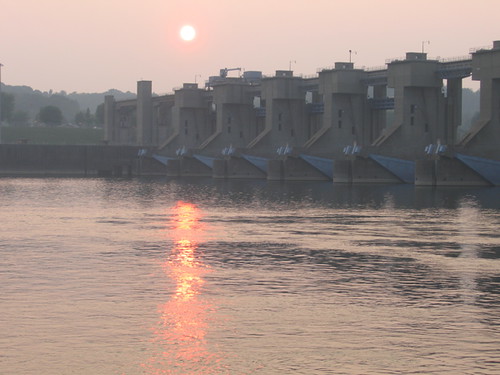My brother took this specatular sunset picture back in August when he and my nephew visited WV. I think it is the Willow Island Lock and Dam, but maybe it's the Belleville one?
Regardless, we have been continuing our series at h2o looking at the fall of humanity. By the way, if you have itunes software on your computer, you can listen to messages for free by opening itunes, clicking podcast, and typing "H2O Morgantown Live" into the search box.
When Adam and Eve ate of the fruit, not only did they pollute all humanity with the stain of sin, but now all of God's good creation exists under a curse. And our relationship to the created world is also broken.
According to Genesis one, the first commandment we human beings have is to "have dominion over the created world." This word, dominion, means something different than domination. You see, parents have dominion over their children. Teachers have dominion over their students. If we saw one of these authorities abusing the responsibility they had been given we would quickly intervene.
In Genesis Chapter 2, Adam is placed in the garden to "cultivate and keep" the garden. The words in Hebrew here mean "to protect and bring out the potential of." So we are told that we need to care for creation and act as wise stewards over the resources God has entrusted to us.
So how are we to go about this? How can we be better stewards. I may blog more about all of this in the future because it is such an important and overlooked topic, but for now, here are a few suggestions.
Switch out your light bulbs for "Compact Fluorescent Bulbs" Personally, I have seen a significant drop in my electric bills. After you switch, you can join my group Friends of Chanchanchepon on One Billion Bulbs and see how much money and energy we are saving each year.
Another thing you can do is start walking, riding a bike or carpooling (or even taking a bus). In our little town of Morgantown, the bus system is free for WVU students. And as Morgantown grows, our streets will become more congested with traffic. When you walk, you feel better, save energy, and save gas $$$. When you carpool, you can potentially reduce the environmental impact of your travel by up to 80%.
Buy locally, and eat in. Locally grown food tastes better, and doesn't have to travel as far for you to enjoy it. Plus you get the joy of supporting a local farmer, and supporting your community. Eating in also saves money, and cooking can be quite relaxing. Morgantown's Farmer's Market runs until the end of October.
There are many other ways you can minimize your environmental impact and begin to be a better steward of the resources God has given you. What are some things you are doing to more faithfully care for God's world?
Regardless, we have been continuing our series at h2o looking at the fall of humanity. By the way, if you have itunes software on your computer, you can listen to messages for free by opening itunes, clicking podcast, and typing "H2O Morgantown Live" into the search box.
When Adam and Eve ate of the fruit, not only did they pollute all humanity with the stain of sin, but now all of God's good creation exists under a curse. And our relationship to the created world is also broken.
According to Genesis one, the first commandment we human beings have is to "have dominion over the created world." This word, dominion, means something different than domination. You see, parents have dominion over their children. Teachers have dominion over their students. If we saw one of these authorities abusing the responsibility they had been given we would quickly intervene.
In Genesis Chapter 2, Adam is placed in the garden to "cultivate and keep" the garden. The words in Hebrew here mean "to protect and bring out the potential of." So we are told that we need to care for creation and act as wise stewards over the resources God has entrusted to us.
So how are we to go about this? How can we be better stewards. I may blog more about all of this in the future because it is such an important and overlooked topic, but for now, here are a few suggestions.
Switch out your light bulbs for "Compact Fluorescent Bulbs" Personally, I have seen a significant drop in my electric bills. After you switch, you can join my group Friends of Chanchanchepon on One Billion Bulbs and see how much money and energy we are saving each year.
Another thing you can do is start walking, riding a bike or carpooling (or even taking a bus). In our little town of Morgantown, the bus system is free for WVU students. And as Morgantown grows, our streets will become more congested with traffic. When you walk, you feel better, save energy, and save gas $$$. When you carpool, you can potentially reduce the environmental impact of your travel by up to 80%.
Buy locally, and eat in. Locally grown food tastes better, and doesn't have to travel as far for you to enjoy it. Plus you get the joy of supporting a local farmer, and supporting your community. Eating in also saves money, and cooking can be quite relaxing. Morgantown's Farmer's Market runs until the end of October.
There are many other ways you can minimize your environmental impact and begin to be a better steward of the resources God has given you. What are some things you are doing to more faithfully care for God's world?

No comments:
Post a Comment